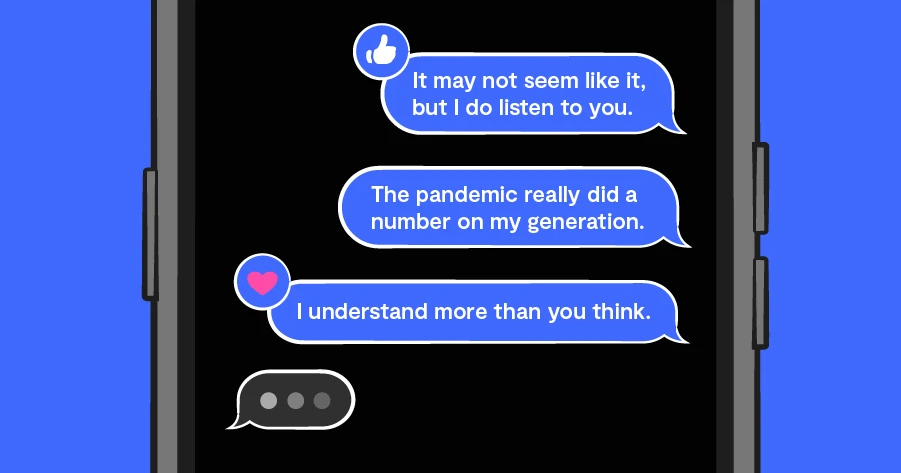
Being a teenager is never easy, and that’s something nearly every generation experiences. You’re caught in between two worlds, and you desperately want to be grown and taken seriously. Unfortunately, even though we were all once teens, it’s amazing how quickly you can forget how strong these feelings can be.
To help remind you what this time was like, we’ve assembled five important feelings that teens wish their parents better understood. We hope it helps you see things from their perspective a little clearer.
5 Things Teens Wish Their Parents Knew
1. “It may not seem like it, but I do listen to you.”
It is a truth universally acknowledged that teens never, ever, want to admit that their parents are right about something. This is because as a teen, you feel like you’re the first person in the history of the world experiencing everything for the very first time.
But even the most stubborn of kids is also always listening to what their parents are saying — and in more ways than you might think. They listen to how you talk about having a bad day at work, how you talk about missing your own parents, how you wish you had more hours in the day to relax.
Kids learn and absorb so much from their family, even if they’re unaware of it or unwilling to admit it. They’ll take in your political beliefs, sense of humor, and taste in movies. As a parent, you’re setting an example not only by what you say, but what you do, and how you live, day in, and day out.
And those times you warned them about something and it came true? They did listen to it (even if they didn’t follow it). And when they're older, they’ll remember it as love.
2. “The pandemic really did a number on my generation.”
The COVID-19 pandemic disrupted the entire world, and millions of lives were lost over the course of a few years. It was a tragedy the likes of which the world had never seen.
For those lucky enough to escape unscathed, it meant 2+ years of isolation and separation. Many adults worked from home and (sometimes) enjoyed the break from social obligations. For others, balancing childrearing and working from home was a disaster.
But kids also had their entire young worlds upended. Zoom school was difficult, frustrating, and not entirely successful. Some kids still claim that they learned almost nothing during those years. The complete disruption of daily schedules and the best parts of being a kid — school dances, sports, sleepovers, trips, and clubs — were dashed. Parents could go back into the office once things were over, but kids couldn’t go back to 7th grade for a do-over.
Now that the world is mostly back to normal, there are often two approaches kids are taking. Some are going all-out trying to make up for lost time. Others have retreated into themselves, accustomed to the online comforts of Discord, gaming, and the safety of indoors. It remains to be seen how these years of isolation will affect the long-term mental health of this generation — especially in the critical years of youth when socialization and milestones are so important.
3. “I understand more than you think.”
With the instant access to all of human knowledge that the internet provides, kids know a lot more than we did when we were their age. This goes for all sorts of subjects — money, relationships, politics, culture, even sex. Growing up in the digital age means you grow up a lot faster, for better or worse.
This means you can talk to your child directly a lot of the time without pulling too many punches. When you do this, they’ll appreciate the respect you’re showing them and will be more likely to engage in a meaningful way. They may not have a ton of world experience, but they can recognize key events, people, and themes — and may even have their own unique perspective on it all.
4. “My phone is my lifeline.”
Teens aren’t drawn to their phone for no good reason — devices provide communication, information, connection, entertainment, and so much more. As an adult, you know this is true for yourself, as well.
This doesn’t mean that kids shouldn’t have guardrails and screen time limits. After all, their brains are still developing and it’s our job as parents to keep them on the right track.
But it’s important to keep in mind that the way we live now is so, so different from growing up in the ‘80s. Not to mention that the pandemic helped really cement digital communication as the go-to source for chatting. Hanging out with friends used to look like roaming Barnes & Noble or hanging out at Denny’s late into the night. This still happens, of course, but it also looks like playing Fortnite online with five of your best friends who live in different states.
5. “Sometimes — even though I’ll never admit it — I just want to be a kid still.”
The pressure to grow up fast begins at a young age — think how many kids demand that you refer to them as “6 and a half” instead of “just 6.” As they get bigger, they strive to shake free of kid-like habits and clothes, desperately trying to fit in with the cooler, older kids.
But there’s a tension that can emerge. All of the fun stuff that comes with being older, like driving and dating, can get overwhelmed by other responsibilities like working, taking advanced classes, and more. And older teens are just a few short years away from being legal adults, which means college, full-time jobs, the military, or other new paths in life.
Kids recognize this, and sometimes just want to be a kid, reveling in kid-stuff like video games, family board game nights, and bike rides. When you recognize these moments in your teen, lean into them. Make that grilled cheese. Pull out the photo albums. They’ll be grown before you know it.
How Bark Can Help
Raising kids in the digital age can be a challenge, but Bark is here to help! Our tools help you set healthy boundaries around screen time, block inappropriate websites, and track location. Our most powerful parenting tool is monitoring. Bark scans your child’s texts, emails, and social media for signs of potential dangers and sends you alerts so you can check in and make sure everything’s okay.
Parents write in every day to tell us how Bark alerts kickstart important conversations, helping to improve their relationship with their child and protect them online and in real life. Try Bark free for a week to see how it can change your family’s life.
Read more
Bark helps families manage and protect their children’s digital lives.





